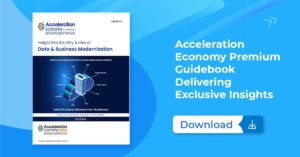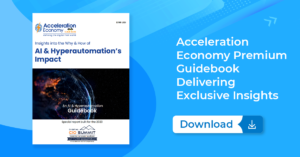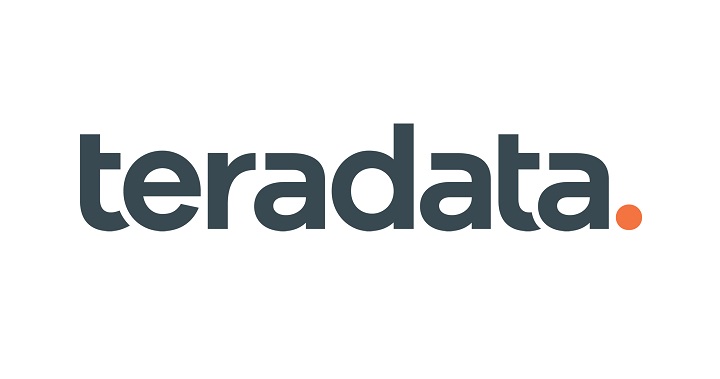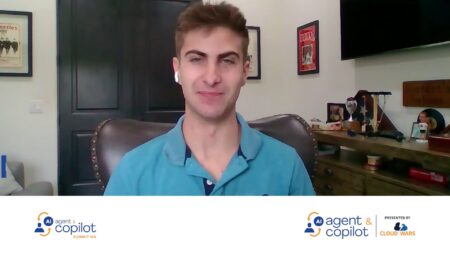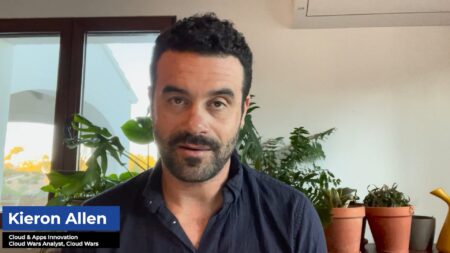
Data flexibility, data scalability, and data volumes were key topics that surfaced during the Acceleration Economy Data at Scale Digital Summit that took place on May 11.
The CXO Practitioner Roundtable put each of those topics into perspective as Acceleration Economy practitioner analysts John Siefert, Scott Vaughan, Joanna Martinez, Kenny Mullican, Wayne Sadin, and Tony Uphoff shared their first-hand experiences and insights. In addition, speakers from Teradata and AWS shared insights on everything from defining business value to partners ecosystems.
CXO Expectations
“Expectations have gone up exponentially. I think based on the data-cloud-lake technology; we now have access to volumes of data,” said Tony Uphoff, a four-time CEO, setting the tone. “You don’t have to be a Fortune 100 company to be able to set up the infrastructure for that. Which leads me [as a CEO] to look much more broadly to data that we can bring together and understand.”
Scott Vaughan, three-time CMO, continued that theme: “The buyer’s expectations, your customer’s expectations, have changed. How they buy, where they buy from, what they expect to have access to, the partner channels they can to where they can get information. It’s become self-served.”
Particularly fascinating were the personal examples that Chief Procurement Officer Joanna Martinez shared about the shifting conversations she is having with companies. “I realized that half [of my meetings] were with CEOs of data businesses,” said Joanna. “Before it might have been professional services, but emerging even more is the importance of the businesses that provide and analyze the data.”
Wayne Sadin, CDO, and Kenny Mullican, CIO, rounded out the discussion with a focus on Teradata’s VantageCloud Lake on AWS and the capabilities offered to their respective roles. Sadin reflected on what the others covered. “I heard all of you say, ‘But I need this data, and I need that data, and then they need this data, and we gotta get going, and we gotta democratize data,’” he said. “So, when you take a look at the VantageCloud Lake, it’s an effort from Teradata to say, ‘We can support not only your top-of-the-house enterprise structured data analysis, but we can give you the flexibility, the democratization, the openness, and the access.’”
Kenny expanded on this by discussing some of the all-in-one, cost-saving benefits of VantageCloud Lake. “Most of these cloud providers can offer a very effective way to host the information, but sometimes where they really get you is in the cost of egress fees,” he said. “This idea of the [data] lakehouse, [which combines] the benefits of the data lake and the data warehouse, keeps the data where it is, and [provides] an ability to tap right into it with the BI and the analytics, those kinds of tools are extremely powerful.”
Lastly, Kenny capped the discussion with, “[These tools] help with what Wayne was talking about, controlling costs. We (CIOs/CDOs) would love to just give the CEO and CMO exactly what they want, but sometimes we realize, ‘Hey, who’s gonna pay for that? My budget doesn’t have enough to cover those kinds of costs.’ That’s where I see the value from these products like what Teradata’s [made] available for us.”
Defining the Business Value
As for the phrase, “data is the new oil,” Wayne put it this way, “So, what [data] has in common with oil, in addition to the fact that it drives the economy, is when it comes out of the ground, oil is a disgusting, sticky mess. And unless you spend a lot of time, energy, and money with the right governance around the raw material, you don’t get the finished product.”
Teradata’s Chief Product Officer, Hillary Ashton, built on Wayne’s comments by saying, “Data is the new oil to drive outcomes. It’s not information for information’s sake or data for data’s sake, but it’s really driving those outcomes.”
Wayne hammered the point home by calling out the headlines featuring companies that have been repatriating data back on-premise: “I think that’s a nonsense conversation for most companies. However, it points out that the costs have gotten to the point where executive management and the board are starting to say, ‘Are we getting value?’ And, with a product from Teradata, we now have the ability to both look at the value we’re getting and compare it to the cost. [Then] rein cost in so that it is not uncontrolled and unrestrained, and as a person that has to manage the budget, I’m very happy to hear that.”
The conversation then shifted to the topic of artificial intelligence (AI)/machine learning (ML) as this technology is creating mountains of new data, along with new data types, that need to be harnessed. “With VantageCloud Lake, we’re able to synthesize that data and give data scientists new data sources that, perhaps in a more governed enterprise environment, they didn’t have access to,” said Hillary. “Our integration with AWS SageMaker, [allows you to] run your MLOps training right there and then bring it back into Teradata Vantage and start running those analytic models at scale with that price performance efficiency that Teradata is really well known for.”
Defining the Customer + Partners Ecosystem Value
“I laugh a little bit because people use words like ‘digital transformation’ and they put bows around them and make them sound pretty,” said Acceleration Economy Co-Founder and Practitioner Analyst John Siefert. “The reality is they’re messy and they’re very hard, especially, when you’re going through a data modernization project where you’re moving from traditional on-prem environments to a cloud-based environment. You need partners and you need platforms that enable you to do that in a seamless way that doesn’t totally disrupt your business.”
Chris Grusz, General Manager, WW ISV Alliances & Marketplace for AWS, responded, “The value of having a network of partners is critical. It’s impossible to get everything done just by yourself. History has proven that just does not work out.” He continued by sharing that Amazon has a term it uses called “customer-obsessed,” which means always looking for the best ways to provide solutions to customers, and oftentimes those solutions might not be an AWS service.
“The beauty of VantageCloud Lake on AWS, “ John stated, “is that this enables me to say, ‘Hey, I can have unstructured content, and structured data that’ll live in one environment and be able to pull information out of the analytics. Because the data is irrelevant. It’s the information that matters. You can use [it] to make business decisions.”
Chris concurred, adding: “You know, the days of everything residing in just one database [are] gone. There’s data all over the place.” Referring back to what Hillary Ashton shared, Chris said, “You oftentimes hear that data is the new natural resource, but it’s so true! Being able to pull the data from across your entire organization, to get that holistic view and harness those insights, it’s candidly ‘table stakes’ for a lot of our companies.”
Customers looking to tap into the powerful “natural resource” of data is something that Amazon/AWS has provided through its database marketplace — or, as Chris called it, “a software supply chain.”
“So, we go from a publisher like Teradata asking, ‘How do we get that software over to the AWS customer? How do we streamline how they look at legal terms and do the vendor assessment?’ All those components that were manual paperwork and streamlined that across that [AWS software] supply chain.”
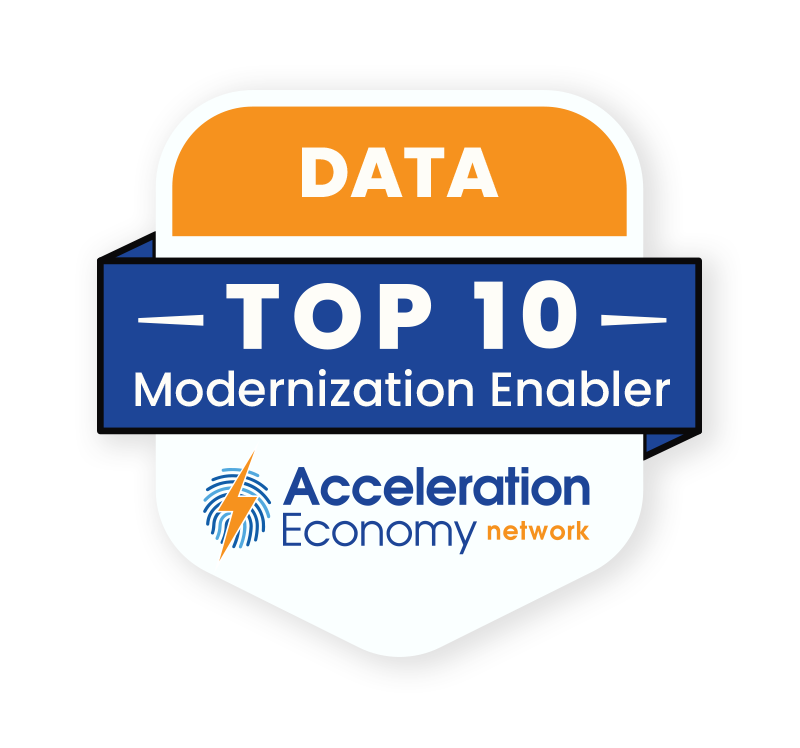
Which companies are the most important vendors in data? Check out the Acceleration Economy Data Modernization Top 10 Shortlist.
AI/ML Coupled With Data Access and Governance
“The markets are moving in nanoseconds, customer expectations are changing, and industries are being reinvented, said Scott Vaughan, while commenting on the realities of business today. “This isn’t hyperbole. This is the speed and the pace of business. If we don’t start to use machines and all that data-crunching capability, you are going to be left behind, and that’s a significant change in mindset.”
“[Also,] we’re in a different era of technology especially with artificial intelligence and machine learning. But, you need the types of culture, you need the type of infrastructure that can scale up and down with the speed, and you need the right partner,” he said.
Adding to that, Pranay Dave, Director of Product Marketing for Teradata, stated, “If companies want to be really successful in digital-led transformation, they need to use all their data. They also need to have artificial intelligence and machine learning capabilities at scale. All the work which is done by data scientists needs to be operationalized and converted into business outcomes. And this is where the VantageCloud Lake on AWS really helps businesses to go beyond just enterprise workloads and into workloads with artificial intelligence.”
Amazon Marketplace Principal of Data Science and Analytics Sri Raghavan continued the conversation, “The native services that are being built in AWS [allow the customer] to pick and choose the ones that are optimal to a superior architecture like VantageCloud Lake. I happen to know because I worked on it when I spent my time at Teradata. So, I know both sides of the coin, and both of them worked very well together.”
Scott asked Pranay: “What are some of the common hurdles that VantageCloud Lake on AWS could knock down [for customers]?”
Pranay put it this way: “AI and machine learning people try to think in terms of an algorithmic problem, but in fact, it’s not. You need to think in terms of three categories. The first is a data problem. Most customers spend 80% of the time just preparing the data. The second is a scale problem. We all say that cloud offers unlimited resources, but customers know they do not have unlimited budgets. [The last] is a deployment problem. Data scientists have done great work, but then it takes months just to deploy all the models into production.”
The problems that Pranay outlined point directly to the need for the right types of people to be “at the table” having the relevant conversations to address and solve these problems. Sri called out three personas that need to be involved. “Number one, the person that I think is one of the most important is a person who actually understands the underlying business outcome and the problem at hand.”
“Number two, I’d like to bring in somebody from the technology office because I’d like to understand, ‘What’s your existing technology debt? What’s your landscape?’”
“[Number three,] is the person who handles the budget, the CFO, [to understand] ‘What are our constraints?’ You give data scientists free rein, and they will spend all the money in the world. We have to be realistic about the constraints.”
Final Thoughts
Scott, Sri, and Pranay ended the conversation with a few takeaways. Scott led by saying: “Really think data first. You can build the greatest [thing] ever, but if you can’t really utilize, understand, and access the data, and get into it culturally, every aspect of it is not gonna go the way you want it.”
Pranay followed up with: “AI-led digital transformation is real. It’s the responsibility of all the executives and all the leaders within the company to make sure that they take advantage of this scaled digital transformation, and they have the greatest technology [with] VantageCloud Lake on AWS to make it happen.”
Sri closed the conversation: “You can put all the technology in place, but if you don’t fully know what your business outcome is, what the end state needs to be, then you get into all kinds of trouble. So, it’s about being able to understand your business, being able to articulate a business outcome, worrying about the data, [then figuring out] the right kinds of technology and – shameless plug — at this point it’s VantageCloud Lake on AWS.”
Want more insights into all things data? Visit the Data Modernization channel:



